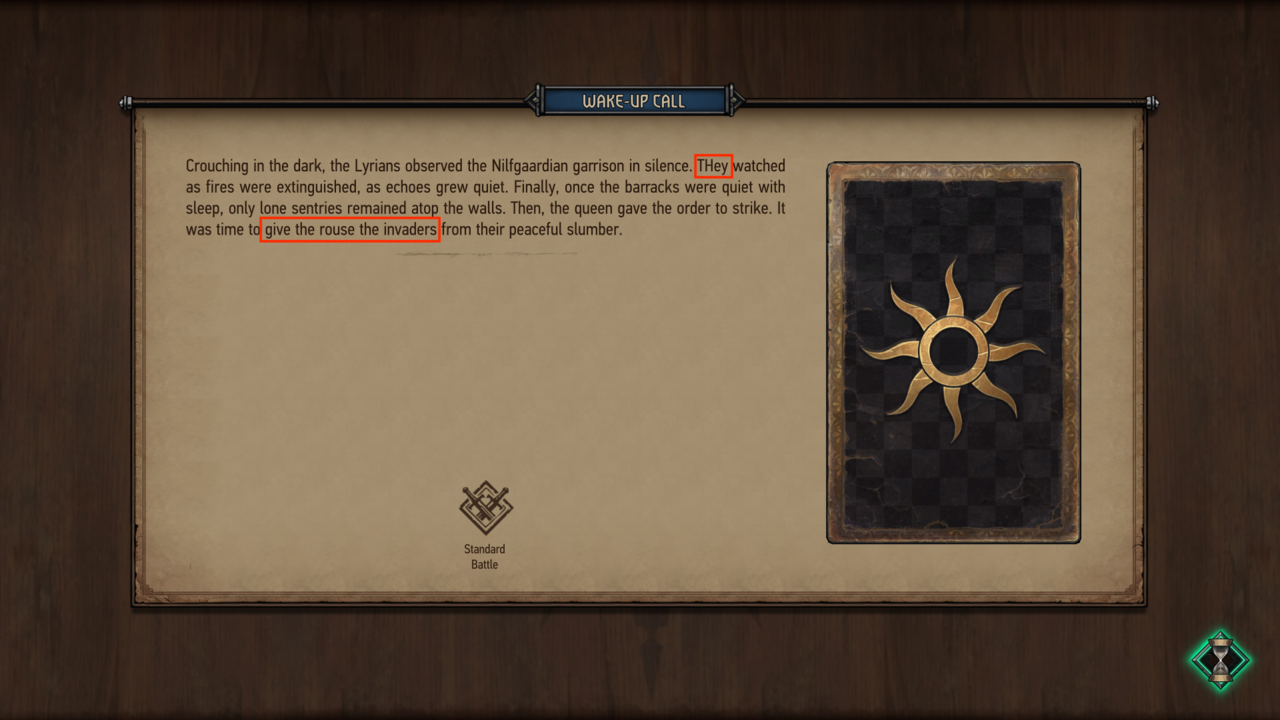I'm here to kill elves and kick ass... and I'm all out of elves.
Thronebreaker ends up feeling like a pretty impressive card-based adventure game, but a missed opportunity to teach advanced Gwent mechanics; and a well-told story on its own, but a failure to live up to The Witcher's narrative pedigree.
Queen Meve's story is an interesting tale of betrayal and conquest, but -- that's just it: the story isn't really about Queen Meve. It's about the betrayal, and the conquest. Thronebreaker's tale has a satisfying plot arc, crossing diverse environs and factions, and introducing the Lyrians to some exotic characters. But all of those characters have one-note personalities. Only Meve herself, and her attachés Reynard and Gascon, ever show more than one dimension of themselves; and even them, only barely.
Meve's army takes on a few special characters throughout their adventure, and while these recruits are well-integrated into the story, they're not really interesting as characters. Rayla's a racist. Isbel's a pacifist. Barnabas is a crazy tinkerer. Each of them can be described in 1-2 words, has exactly one interesting piece of backstory, and will very rarely throw out a short quote during a card battle.
It's because of these flat characterizations that the story choices in Thronebreaker rarely feel difficult, or personal. They'll test your practicality, and occasionally your morals, as when you weigh the lives of humans and non-humans in a struggling village. But who are those humans and non-humans? Who are the other villagers? The individual persons in Thronebreaker's story are almost never named, let alone described, and so these choices have no emotional stakes or consequences.
Even choices regarding the special characters end up feeling less about "them," and more about the practical effects of their Gwent cards, or the moral effects of Rayla being a racist.
So it's disappointing that Thronebreaker's character building isn't as strong as Wild Hunt's was. That aside, though: the plot is good, and the story is well-written. There's a ton of voice acting, and it's universally excellent; Meve sounds like a strong commander, Gascon sounds like a sly rascal, the nameless peasants sound hapless, and the Nilfgaardians sound like determined yet incomprehensible invaders.
The presentation of Thronebreaker's story is pretty consistently great, except for a handful of shortcomings in text editing (mostly toward the end).

But the game's story is only half of the game's "story." When it isn't a text adventure with light resource management, Thronebreaker is Gwent, the card game! And like I wrote before, that game is further subdivided into "regular" matches, and puzzles.
Contrary to my earlier assumption, the puzzles aren't generally about trying to teach you "how to Gwent." Some of them are brain-teasing, often hard challenges that ask you to exploit the intricacies of card rules against one another. And some of them use custom rules to be clever and inventive, like a Hearthstone parody, or a card-based stealth maze (avoid patrolling guard cards!). They all feel pretty novel, and I was consistently impressed with the puzzles' creativity.
Then there's the regular game of Gwent: a game of deck-building and card-playing. Compared with the Gwent mechanics in Witcher 3, this version has a lot more card effects and possibilities for interaction; there's a lot of potential ground to cover, in terms of strategies and counter-strategies.
In its regular matches, Thronebreaker teaches some good lessons on the card-playing part -- like how to optimally pick enemy targets, or when to unleash a card's Order ability. As for deck-building... well, it's instructive in picking cards that complement the ones you started with. It isn't so instructive in how to build a deck around an alternate strategy.
At least on Normal difficulty, the strategy that comes with those starter cards - largely offensive, plus some point accumulation - is good enough to take out just about anything. I didn't have a reason to try other tactics until the final boss battle, which was a complete shock to my system. I had no idea what to do against an enemy that continually replenished its losses, and which effectively had an endless hand!
(It took a few retries for me to identify what cards I needed for countering this: strategically leaving weak enemy cards alone, so as to exhaust his plays -- while extending my own hand, and refilling my deck, to ensure that I could match those plays.)
Up until that battle, I had plenty of fun with the regular matches; but in retrospect, it's clear that I could have learned more about how to play, if the game had pushed me to.
At the end of the day, Thronebreaker is an exciting adventure with substantial content, and a fun card game in the middle. I wish that it built more engaging characters, and that its card combat was better at teaching deck-building.
But I don't regret the 40-some hours I spent with Queen Meve. Despite its shortcomings, Thronebreaker was still a fun journey.
Better than: Card City Nights
Not as good as: The Witcher 3: Wild Hunt
I might've kept trying to murder my way out of the final boss: if not for an unexpected bug that made my killer strategy unworkable.
Progress: Finished on Normal.